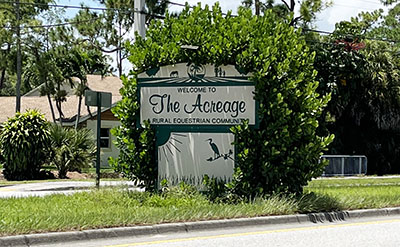Two Loxahatchee-area residents filed suit Friday, April 12 against Palm Beach County in hopes of overturning a Palm Beach County Commission decision to disallow residential tractor-trailer parking in a large swath of the western communities overseen by the Indian Trail Improvement District.
West Palm Beach attorney Christopher Mills filed the suit on behalf of Jorge Alfaro of Prestwich Drive and Clare Dougal of Tangerine Blvd. Alfaro drives a car carrier rig, and Dougal drives a semi hauling sod and building materials. Dougal has been parking her truck at her residence since 2002, according to the suit. Neither plaintiff could be reached for comment.
“Nobody wants to jump into a lawsuit. These people certainly don’t,” Mills said this week. “But they don’t have any other options.”
On Feb. 22, the board rejected a plan by District 6 Commissioner Sara Baxter to allow two semi-trucks on any residential lot in The Acreage. Trucker homeowners were given until July 1 to find parking elsewhere for their rigs.
Mills said the county’s action amounted to an “eviction order.”
“Property rights are an American value… they’re sacred,” Mills said. “The county can’t just take someone’s property without going through the proper legal steps and compensating people. That hasn’t been done here.”
Baxter, who represents the area, has championed the truckers’ cause with the county. “I told my fellow commissioners when we rejected this, we were opening ourselves up to a lawsuit,” she said Wednesday.
Either way, a lawsuit likely was in offing over the issue.
“We knew this was probably coming,” ITID President Elizabeth Accomando said Wednesday. “So, I’m not surprised.”
ITID oversees roads, drainage and parks for some 27,000 acres west of State Road 7 and north of Southern Blvd./State Road 80. The district gets no federal, state or county money for its roads.
ITID Executive Director Burgess Hanson has said that it could cost ITID residents some $200,000 annually in extra road maintenance assessments if the estimated 1,000 to 1,500 trucks already in the district are allowed to remain. If ITID becomes the only residential area in South Florida where big-rigs are allowed — a “trucker haven” — the cost to upgrade roads to handle thousands of tractor-trailer rigs could be as much as $2 billion, according to Hanson.
At the core of the truckers’ lawsuit is the contention that tractor-trailers always had been allowed in the area under county code, Mills said. He said a confusing change to the code was made in 2019, followed by aggressive enforcement during the pandemic, when wealthy individuals and families from out of state moved into the area in large numbers.
“My clients were there doing what they’d always been allowed to do,” he said. “Then there was a paradigm change for whatever reason… I think the evidence will show that there was a strategy involved in this.”
Some supporters of the “Save Our Truckers” movement organized by Acreage resident Natalia Melian have suggested that the changes were an effort to gentrify the area as home prices soared.
ITID’s Accomando has previously disputed the contention that tractor-trailers have been permitted by code in The Acreage. “It hasn’t been allowed since 1992,” she said in February.
Despite that, Accomando said, the number of residents with tractor-trailer rigs has been increasing in The Acreage since officials began pushing truckers out of Miami-Dade and Broward counties a few years ago.
When the county commission rejected Baxter’s two-trucks-per-residence proposal, Commissioner Mack Bernard asked staff to seek a way to resolve the issue before July 1 when truckers would have to move their rigs out of The Acreage or continue to face large fines.
Mills said his clients are open to settling the issue out of court through “any solution that works.”
“At a minimum, the truckers who are there now should be grandfathered in,” said Baxter, adding that she could not state as fact that behind-the-scenes gentrification efforts sparked the code change but “that’s what it feels like. We’ll wait and see what the courts say.”








